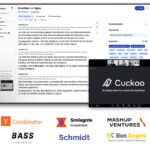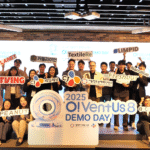On October 19, Startup Alliance and Open Survey co-hosted an event called Startup Trend Report 2017. Speakers included Jung-Wook Lim (Head of Startup Alliance), Sang-Hwan Yang (Leader of Naver’s D2SF), Ye-Won Kang (General Manager at Open Survey) and Hee-Eun Park (Principal at Altos Ventures) and they discussed the development of Korea’s startup ecosystem this year.
Startup Trend Report has been released every year since 2014 by Startup Alliance and Open Survey. Its purpose is to understand industry trends by analyzing the changes in answers to the same questions each year. The survey was conducted through Open Survey from September 4 – 11 in order to understand the perception and reality of the Korean startup ecosystem, especially focusing on the IT and knowledge service industry. 116 startup founders, 500 corporate executives, 200 university students, and 200 IT startups participated in the survey.
The general atmosphere of the startup industry was rated 64/100, and the score for the government was rated 56/100.
Startup Alliance and Open Survey surveyed 116 founders in the IT and knowledge service sectors. The overall rating of the startup ecosystem in Korea was 64 out of 100 points, which went up by nine points from the previous year (55 points). 48.3% answered that the condition of the industry is expected to be better next year, and the main reason for this was the improvement of social awareness due to the appearance of successful startups in different sectors.
Startup Founders ranked the government’s role at 56 points. This also increased by 12 points compared to the previous year. Among the measures that were judged to be beneficial for the startup industry, 32.8 % said that the support for labor costs was the most beneficial. In addition, 75% of the founders said that forming new venture funds for startups is the most helpful policy among the policies that the current government is promoting. In last year’s survey, the most urgent task for the startup ecosystem was to secure infrastructure for funding, but this year, deregulation was selected as the most important challenge.
Foreign countries that startup founders want to expand are, in order of most desireable to least: Southeast Asia, the U.S.A, and China. China was selected as first in last year’s survey, but it went down this year. Sung-Hwan Yang, Leader of Naver’s D2SF, said about these results, “Interest in the China market increased momentarily but it has declined due to several frustrations such as the political issues between China and Korea. Some startups have experienced this negative effect on their business. Nevertheless, there are still a lot of companies seeking to enter China through different routes, such as entering via Hong Kong”.
Commenting on why South East Asia is consistently attracting attention from Korean startups, Hee-Eun Park from Altos Ventures said, “The Southeast Asian market can be predictable because it might go through similar historical steps that Korea has undergone, and they have a positive impression on Korea. There are companies like Bonbon and HyperConnect that Altos Ventures invested in, and they have been successfully stepping into overseas business while staying in Korea. Rather than move overseas without any specific plans, there are new forms of overseas expansion such as inviting local talent to Korea as a new way of recruitment”.
The rate of startup founders’ positive attitude toward overseas expansion was 69.8%, more than double last year’s result (31.3%). When asked about the important factors for overseas expansion, market analyses and market tests were ranked as the highest response with 43.2%, followed by finding the right local partners and building a local network.

The successful entrepreneurs that startup founders want to work with are, from most desireable to least: Bong-Jin Kim (Baedal Minjok), Hae-Jin Lee (Naver), Bum-Soo Kim (Kakao) and Byung-Kyu Jang (Bon Angels). The answer to the ‘fastest growing startup’ differed between people working in the startup industry and people who don’t. Startup founders and employees ranked Baedal Minjok as first, but employees of large corporations ranked Kakao as first and students ranked Coupang as first.
Ye-Won Kang, General Manager at Open Survey, said, “It was impressive that the concept of a ‘startup’ is different for people working for startups and those who don’t. Kakao and Coupang are already considered big corporations in the startup industry, but they are still considered as startups by the general public”. Both corporate employees and university students were asked about representative startups, but many of them could not even respond to the question.
Nonetheless, the growth of the ecosystem has also impacted the employees of large corporations. Similar to last year, people who considered moving to startups (26%) were lower than who did not consider it at all (42%) but people who think positively about starting a new startup accounted for 50.4%, which rose by 10.2% compared to last year. The respondents said that the reasons for this are the government’s abundant support, respect for job diversity, and the fact that individual skills can be utilized as a new business idea.
The most popular venture capital firm is Softbank Ventures
The most popular venture capital firm for early stage startups is Primer and in the later stage, it is Softbank Ventures. It is noteworthy that Altos Ventures and Capstone Partners, which were not in the ranking until last year, have risen sharply.
In terms of unaided brand awareness, Altos Ventures was ranked first, topping Softbank Ventures and Korea Investment Partners. Altos’ investment in Coupang, Baedal Minjok, Toss (Viva Republica) and Memebox seem to have contributed in the rise of awareness. Regarding the result, Hee-Eun Park of Altos Ventures said, “I think there is a good misconception because we have been asking these companies if they could receive our investment and thanks to their hard work, we were able to get great track records. We continue to think about what we need in order to become a VC that startups want to choose.
————————————————————————————-
This article, entitled “Startup Trend Report 2017 in South Korea: Healthier startup ecosystem than last year”, was written in Korean by Margot Jung of Platum, edited by AllTechAsia.






Leave a Comment